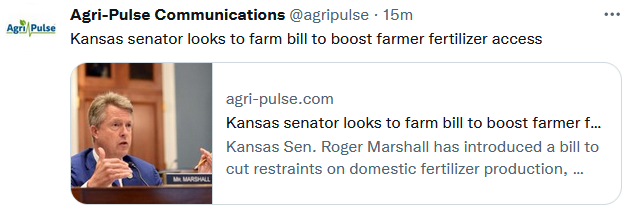(Washington, D.C., November 18, 2022) – U.S. Senator Roger Marshall, M.D. today announced introduction of the Fertilizer Stewardship, Utilization, Sustainability, Technology, Access, Innovation, and Nourishment (Fertilizer SUSTAIN) Act to strengthen our domestic fertilizer industry and ensure that American growers have access to the crop nutrients they need to grow the food that is relied upon by the United States and nations around the world. The Fertilizer SUSTAIN Act builds on Senator Marshall’s leadership fighting to make fertilizer more affordable
“The United States has one of the strongest fertilizer industries in the world, but it would be even stronger if it wasn’t hindered by unnecessary bureaucratic rules that other countries don’t have to follow,” said Senator Marshall. “By eliminating federal fertilizer regulations in the upcoming farm bill, Congress can help our domestic fertilizer producers excel against competitors like Russia and China and provide our growers with affordable fertilizer.”
“Farmers and consumers depend on a stable supply of fertilizer, and we commend Sen. Marshall for his leadership on the SUSTAIN Act,” said The Fertilizer Institute (TFI) President, Corey Rosenbusch. “By advocating for a strong domestic fertilizer industry, this legislation helps insulate our nation’s farmers against the forces of geopolitical instability and helps ensure that our food production system remains the best in the world.”
“High fertilizer prices are adversely affecting family farms across the country,” said National Corn Growers Association President Tom Haag. “Senator Marshall’s bill would boost domestic supply to complement imported fertilizers and hopefully play a role in lowering the cost of these products. We are appreciative of the senator for his leadership on this matter.”
You may click HERE for the full text of the Fertilizer SUSTAIN Act. Agri-Pulse covered the Senator’s legislation. You may click HERE or on the image below to read their story.
Background on the Fertilizer SUSTAIN Act:
The Fertilizer SUSTAIN Act includes provisions related to the issues listed below.
Critical Minerals Designation: Designates potash and phosphate as critical minerals, helping to ensure a more streamlined and reliable permitting process and access to these necessary resources, as well as requiring a study to evaluate other minerals necessary for fertilizer production or other agricultural products for designation as critical minerals.
NEPA Permitting Improvements: Permitting reform will allow domestic fertilizer production to grow and ensure that the industry and farmers can benefit from sourcing the raw materials needed for the final product domestically. Additionally, recent revisions to the National Environmental Policy Act (NEPA) only increase uncertainty and cause significant delays in the federal permitting process and only serve to decrease domestic fertilizer production.
Improves Access to Conservation Programs: Currently a limited number of individuals designated as Technical Service Providers (TSPs) are permitted to write nutrient management plans, and a limited number of groups are permitted to apply for Natural Resources Conservation Service (NRCS) funds. The Fertilizer SUSTAIN Act would recognize Certified Crop Advisors (CCAs) as TSPs, increase cost-share payments under the Environmental Quality Incentives Program (EQIP) and allow agricultural retailers to be eligible for the Regional Conservation Partnership Program (RCPP).
Strengthens Biostimulant Adoption: Requires the United States Department of Agriculture (USDA) to conduct a review of nutrient management practices to determine if plant biostimulants are an eligible conservation practice standard utilizing the definition of “plant biostimulants” contained in the 2019 USDA report to Congress.
Allows for Sustainable Reuse of Phosphogypsum: Reinstates the EPA petition for the use of Phosphogypsum (PG) in government road projects. PG is a byproduct of phosphate fertilizer production and is currently required to be stored in aboveground stacks at a cost of hundreds of millions of dollars. PG is increasingly being safely recycled for a variety of uses in Europe, South America, Asia, Africa, as well as in Canada, and according to the International Atomic Energy Agency should not be restricted in such uses as agriculture, road construction or marine environments.


